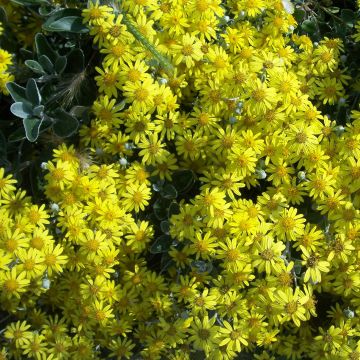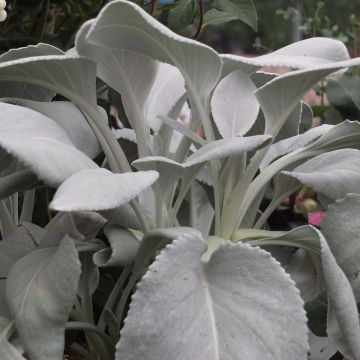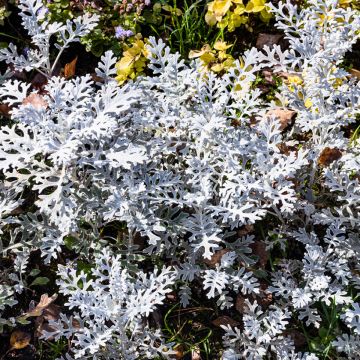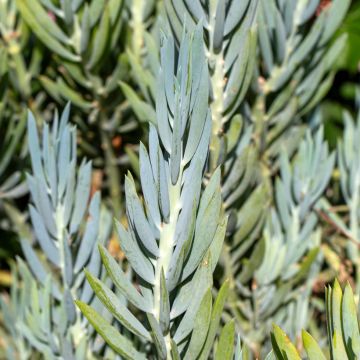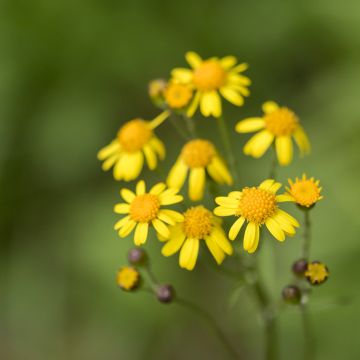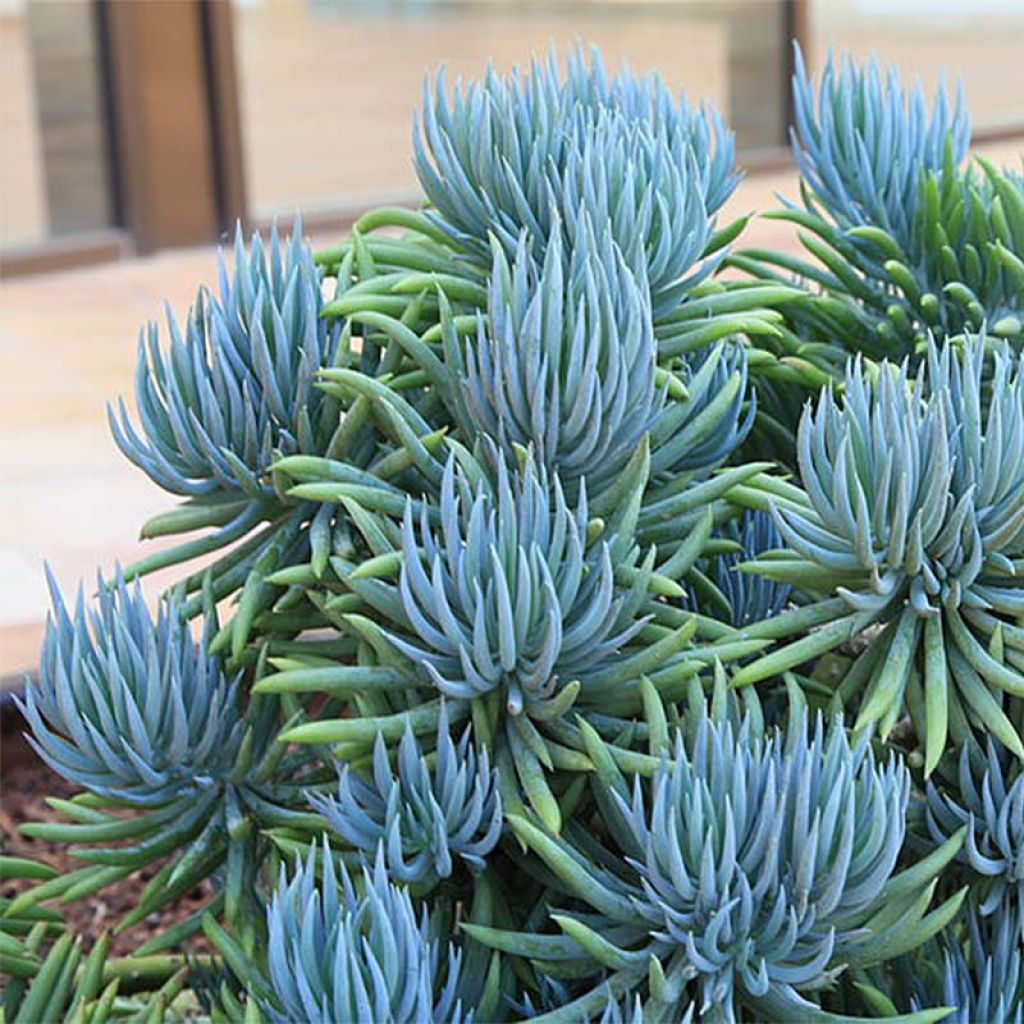

Senecio mandraliscae
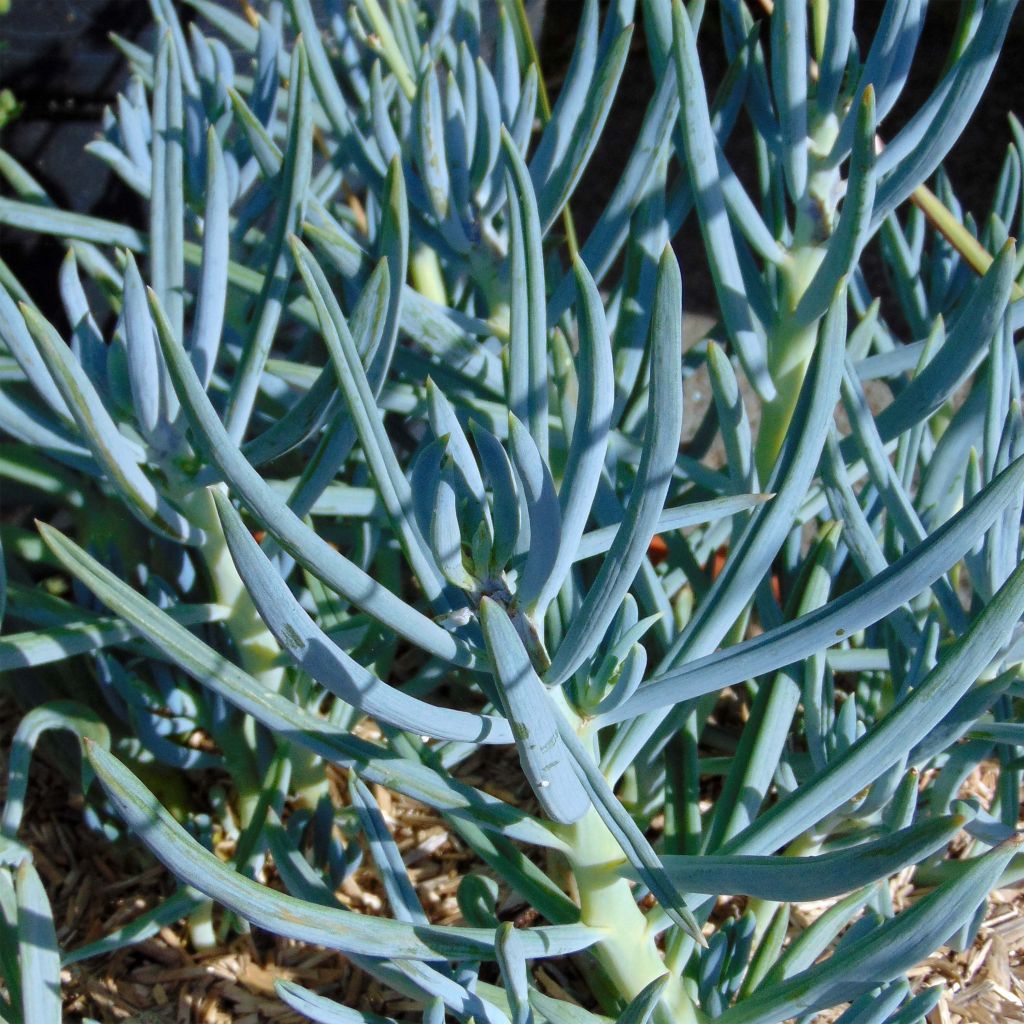

Senecio mandraliscae
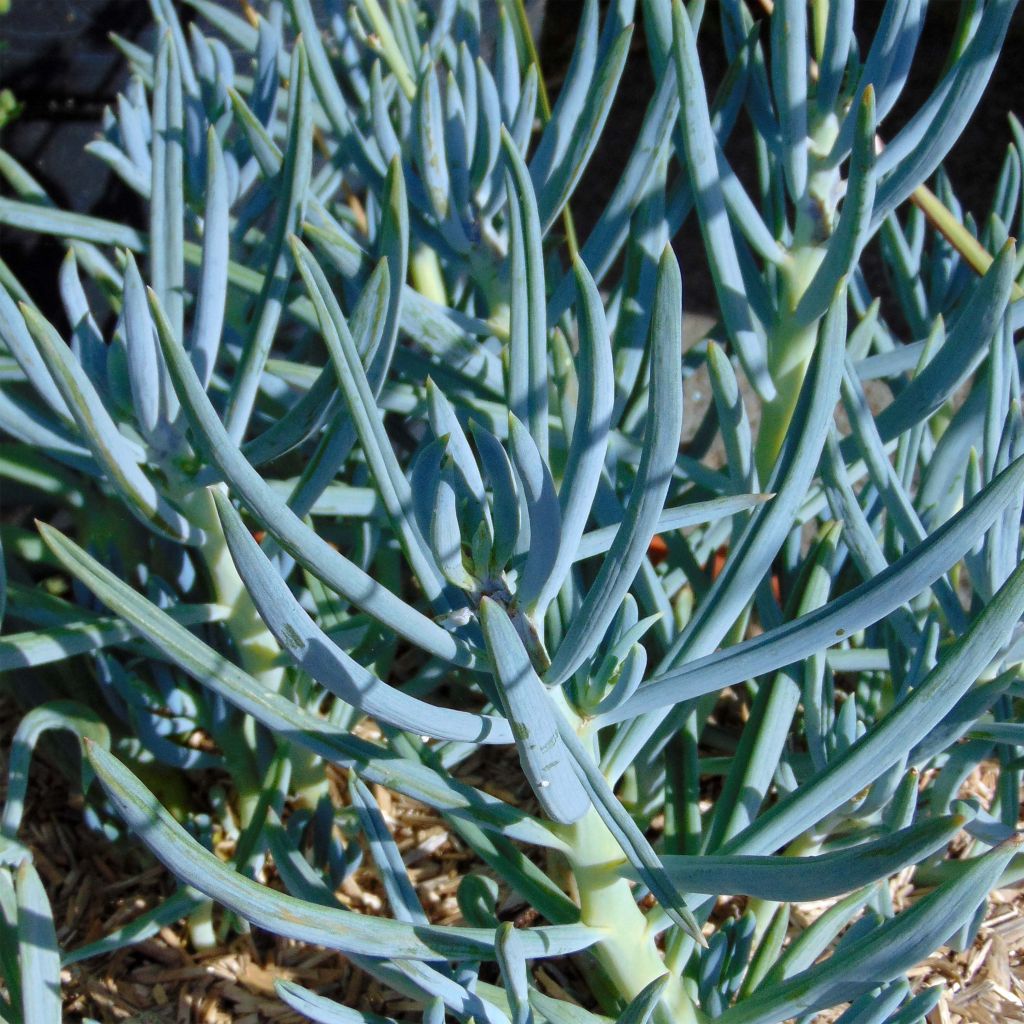

Senecio mandraliscae
Senecio mandraliscae
Senecio talinoides subsp. mandraliscae
Perfect! Young plant looks superb and unique.
Isa, 23/09/2024
Special offer!
Receive a €20 voucher for any order over €90 (excluding delivery costs, credit notes, and plastic-free options)!
1- Add your favorite plants to your cart.
2- Once you have reached €90, confirm your order (you can even choose the delivery date!).
3- As soon as your order is shipped, you will receive an email containing your voucher code, valid for 3 months (90 days).
Your voucher is unique and can only be used once, for any order with a minimum value of €20, excluding delivery costs.
Can be combined with other current offers, non-divisible and non-refundable.
Home or relay delivery (depending on size and destination)
Schedule delivery date,
and select date in basket
This plant carries a 24 months recovery warranty
More information
We guarantee the quality of our plants for a full growing cycle, and will replace at our expense any plant that fails to recover under normal climatic and planting conditions.

Would this plant suit my garden?
Set up your Plantfit profile →
Description
Senecio mandraliscae is a mildly frost-hardy, evergreen shrub, highly appreciated in mild climate landscaping due to its magnificent blue foliage, covered with a silvery bloom. Capable of reaching up to 1 metre (3 feet) in height, it spreads over time if given space, and blooms in summer, in the form of white-cream heads, carried well above the foliage. Frost-sensitive, this South African plant can only tolerate very light frosts if the soil remains dry. Its cultivation in a large pot, in light soil, presents no difficulty and allows it to be protected from frost in winter.
Senecio mandraliscae, common name Blue Finger, is a small, creeping bush from the asteraceae family native to South Africa. Its exact origin is currently somewhat controversial, with some specialists suggesting a hybrid origin with Senecio citriformis, following a spontaneous cross-breeding that occurred in a South African garden. In any case, it is the bluest form of Senecio talinoides.
Forming a low and highly branched bush of up to 1 metre (3 feet) in height, this Senecio spreads over 2 metres (7 feet) over time, with its prostrate and fleshy stems easily rooting upon contact with the ground. This plant grows at a regular, rather fast pace, mainly during the rains, primarily in late summer and spring. Its juvenile appearance is different from that of a mature plant: the juvenile phase is characterized by short branches with short leaves. The adult branches, on the other hand, bear longer leaves, up to 10cm (4in), narrow and tapered, cylindrical, succulent, upright, very blue, covered with a waxy film and white bloom to withstand periods of heat and drought. Flowering generally occurs in late summer in our climates. Leafy and branched floral stems rise among the foliage, bearing small, insignificant cream-white inflorescences at their tips.
Frost-sensitive, this shrub seems to be able to withstand -5°C (23°F) in perfectly dry soil during winter. Therefore, Senecio mandraliscae can only be cultivated in open ground in warm regions. Fortunately, it is easy to cultivate in a large pot elsewhere. The key is to ensure good drainage at the bottom of the pot and provide it with very light, well-drained soil. In this case, watering in summer will be particularly appreciated by the plant. Remember to store it indoors in a bright, airy, cool room, and reduce watering significantly during winter.
Report an error about the product description
Senecio mandraliscae in pictures
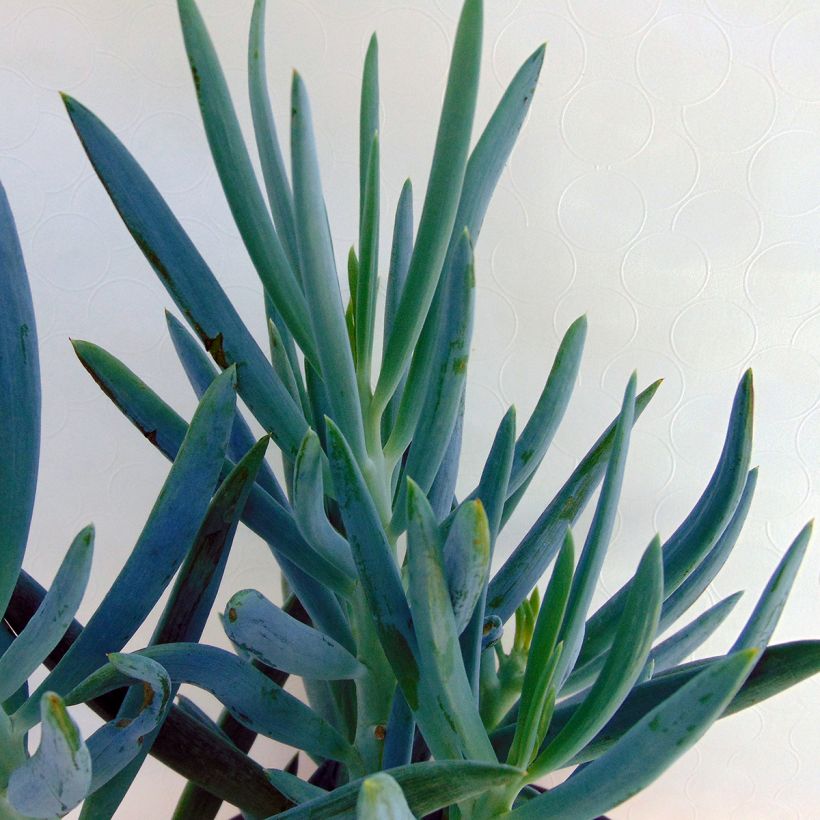

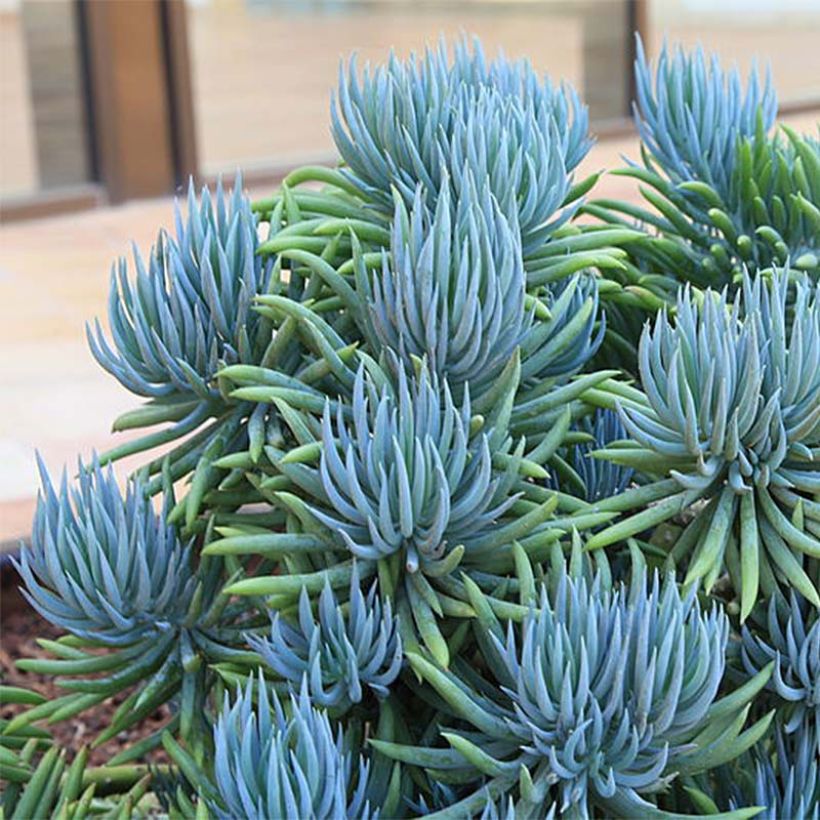

Plant habit
Flowering
Foliage
Botanical data
Senecio
talinoides subsp. mandraliscae
Asteraceae
South Africa
Other Senecio
View all →Planting and care
Plant Senecio mandraliscae in spring, after the last frost, in open ground only in a very mild climate, in a large pot anywhere else. Plant it in a very well-draining soil, possibly mixing coarse sand, gravel, and pumice with your garden soil. Choose a well-sheltered, warm, very sunny to partially shaded exposure. Some generous watering in summer, in dry and hot climates, will stimulate its growth. Native to South Africa, it tolerates moderately dry periods quite well, especially in winter. Outdoors, with effective protection against rain, this plant can withstand temperatures down to -5°C (23°F), but the aboveground parts disappear and the plant restarts in the following spring from its thick and woody roots.
Propagation: very easy by stem cuttings with a few leaves or even just leaves. Seed sowing is also possible.
Planting period
Intended location
Care
-
, onOrder confirmed
Reply from on Promesse de fleurs
Haven't found what you were looking for?
Hardiness is the lowest winter temperature a plant can endure without suffering serious damage or even dying. However, hardiness is affected by location (a sheltered area, such as a patio), protection (winter cover) and soil type (hardiness is improved by well-drained soil).

Photo Sharing Terms & Conditions
In order to encourage gardeners to interact and share their experiences, Promesse de fleurs offers various media enabling content to be uploaded onto its Site - in particular via the ‘Photo sharing’ module.
The User agrees to refrain from:
- Posting any content that is illegal, prejudicial, insulting, racist, inciteful to hatred, revisionist, contrary to public decency, that infringes on privacy or on the privacy rights of third parties, in particular the publicity rights of persons and goods, intellectual property rights, or the right to privacy.
- Submitting content on behalf of a third party;
- Impersonate the identity of a third party and/or publish any personal information about a third party;
In general, the User undertakes to refrain from any unethical behaviour.
All Content (in particular text, comments, files, images, photos, videos, creative works, etc.), which may be subject to property or intellectual property rights, image or other private rights, shall remain the property of the User, subject to the limited rights granted by the terms of the licence granted by Promesse de fleurs as stated below. Users are at liberty to publish or not to publish such Content on the Site, notably via the ‘Photo Sharing’ facility, and accept that this Content shall be made public and freely accessible, notably on the Internet.
Users further acknowledge, undertake to have ,and guarantee that they hold all necessary rights and permissions to publish such material on the Site, in particular with regard to the legislation in force pertaining to any privacy, property, intellectual property, image, or contractual rights, or rights of any other nature. By publishing such Content on the Site, Users acknowledge accepting full liability as publishers of the Content within the meaning of the law, and grant Promesse de fleurs, free of charge, an inclusive, worldwide licence for the said Content for the entire duration of its publication, including all reproduction, representation, up/downloading, displaying, performing, transmission, and storage rights.
Users also grant permission for their name to be linked to the Content and accept that this link may not always be made available.
By engaging in posting material, Users consent to their Content becoming automatically accessible on the Internet, in particular on other sites and/or blogs and/or web pages of the Promesse de fleurs site, including in particular social pages and the Promesse de fleurs catalogue.
Users may secure the removal of entrusted content free of charge by issuing a simple request via our contact form.
The flowering period indicated on our website applies to countries and regions located in USDA zone 8 (France, the United Kingdom, Ireland, the Netherlands, etc.)
It will vary according to where you live:
- In zones 9 to 10 (Italy, Spain, Greece, etc.), flowering will occur about 2 to 4 weeks earlier.
- In zones 6 to 7 (Germany, Poland, Slovenia, and lower mountainous regions), flowering will be delayed by 2 to 3 weeks.
- In zone 5 (Central Europe, Scandinavia), blooming will be delayed by 3 to 5 weeks.
In temperate climates, pruning of spring-flowering shrubs (forsythia, spireas, etc.) should be done just after flowering.
Pruning of summer-flowering shrubs (Indian Lilac, Perovskia, etc.) can be done in winter or spring.
In cold regions as well as with frost-sensitive plants, avoid pruning too early when severe frosts may still occur.
The planting period indicated on our website applies to countries and regions located in USDA zone 8 (France, United Kingdom, Ireland, Netherlands).
It will vary according to where you live:
- In Mediterranean zones (Marseille, Madrid, Milan, etc.), autumn and winter are the best planting periods.
- In continental zones (Strasbourg, Munich, Vienna, etc.), delay planting by 2 to 3 weeks in spring and bring it forward by 2 to 4 weeks in autumn.
- In mountainous regions (the Alps, Pyrenees, Carpathians, etc.), it is best to plant in late spring (May-June) or late summer (August-September).
The harvesting period indicated on our website applies to countries and regions in USDA zone 8 (France, England, Ireland, the Netherlands).
In colder areas (Scandinavia, Poland, Austria...) fruit and vegetable harvests are likely to be delayed by 3-4 weeks.
In warmer areas (Italy, Spain, Greece, etc.), harvesting will probably take place earlier, depending on weather conditions.
The sowing periods indicated on our website apply to countries and regions within USDA Zone 8 (France, UK, Ireland, Netherlands).
In colder areas (Scandinavia, Poland, Austria...), delay any outdoor sowing by 3-4 weeks, or sow under glass.
In warmer climes (Italy, Spain, Greece, etc.), bring outdoor sowing forward by a few weeks.






























